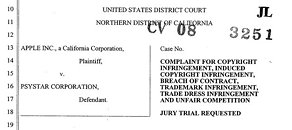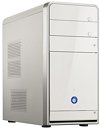qubit
Overclocked quantum bit
- Joined
- Dec 6, 2007
- Messages
- 17,865 (2.82/day)
- Location
- Quantum Well UK
| System Name | Quantumville™ |
|---|---|
| Processor | Intel Core i7-2700K @ 4GHz |
| Motherboard | Asus P8Z68-V PRO/GEN3 |
| Cooling | Noctua NH-D14 |
| Memory | 16GB (2 x 8GB Corsair Vengeance Black DDR3 PC3-12800 C9 1600MHz) |
| Video Card(s) | MSI RTX 2080 SUPER Gaming X Trio |
| Storage | Samsung 850 Pro 256GB | WD Black 4TB | WD Blue 6TB |
| Display(s) | ASUS ROG Strix XG27UQR (4K, 144Hz, G-SYNC compatible) | Asus MG28UQ (4K, 60Hz, FreeSync compatible) |
| Case | Cooler Master HAF 922 |
| Audio Device(s) | Creative Sound Blaster X-Fi Fatal1ty PCIe |
| Power Supply | Corsair AX1600i |
| Mouse | Microsoft Intellimouse Pro - Black Shadow |
| Keyboard | Yes |
| Software | Windows 10 Pro 64-bit |
In a court ruling on Wednesday 28th September 2011, Apple's assertion that any kind of 'Hackintosh' was, is and always will be, illegal, was conclusively affirmed. This will bring great dismay to Psystar customers, potential purchasers of other "alternative Macs" and the many PC enthusiasts who want to run the latest Apple OS on the high-spec rigs they've built themselves from hand-picked components. This ruling has unfortunately sounded the death knell for enterprising and surprisingly plucky upstart outfit, Psystar, who showed what could be possible with an open mind and technical skill. UPDATE after the jump.



Psystar began selling their Mac OS X-capable Open Computer in April 2008, despite the fact that they unequivocally broke Apple's licensing restrictions. The EULA read:
For a surprisingly long time, Apple did nothing. This caused some industry pundits to suggest that perhaps Apple had given their tacit approval for a clone. However, it turned out that this was most certainly not the case and Apple eventually sued Psystar. However, what surprised many, is that Psystar quickly countersued, asserting that Apple's EULA violated the Sherman and Clayton antitrust acts.
In short, the case had more twists and turns than a whodunit novel, with Psystar actually winning a couple of small victories, although it was all ultimately for nothing. Psystar even filed for bankruptcy and just when it looked like it was all over, emerged phoenix-like from the ashes to continue fighting Apple. A surprising accomplishment in the face of such a powerful and relentless legal onslaught.
However, this Wednesday, Apple finally got the hands-down victory they had fought for so long, when judge Mary Schroeder of the US District Court of Appeals of the Ninth Circuit in San Francisco issued the final words in this case:
But even in defeat, Psystar won a tiny victory. Apple - in its eternal quest to protect any and all information about itself - had asked Schroeder to keep documents about the summary judgement case sealed. Schroeder refused, saying that to do so "without explanation" was out of bounds.
So there still remains the small matter of whether Apple will be able to keep select court documents sealed, which may cause a smile or two among Psystar supporters. Of course, the damages that Psystar is now liable for are going to completely sink what's left of the company. It's doubtful that Apple will actually see all the money that they're owed and likely that they won't care. It was all about stopping the competition.

So, are Apple triumphant in all this? Yes, they have been able to put the genie back in the bottle, they want to protect the 'purity' of their Apple Mac brand and keep any and all profits from the brand, which they have achieved. However, the bottom line is will this actually result in more money flowing into their bank account? It may not.
Think of the original IBM PC: it was cloned, against IBM's wishes and due to a legal technicality, they couldn't stop it. However, this made the platform grow phenomenally into the industry-dominating juggernaut that it is today, together with all the niche spin-offs, including the high performance enthusiast segment. And critically, it has made IBM's product much more successful and lucrative for them than if IBM had been allowed to keep it closed and proprietary with high prices.
So, by the same token, keeping the Mac platform closed and proprietary, Apple are likely to actually reduce awareness and interest in their products. Therefore, ironically, Apple's victory in court may actually be a bigger victory for those in the Anti-Apple camp, who want to see their market penetration remain small and who would be happy if they just faded away into obscurity. So, will Apple's current stance remain now that Steve Jobs has stepped down as CEO and no longer has such a dominating influence over the company? This remains to be seen.
By restricting their products this way, Apple have actually reduced the market penetration of their much-loved operating system, since running it on more and cheaper hardware configurations is no longer possible. Many people that like the Mac OS would normally never buy a Mac due to the sheer cost of entry to the club, which this would have lowered. In time, those same customers may well want the 'real thing' for their next machine and buy a genuine Mac. There's no reason why Apple couldn't have licensed the OS for Psystar hardware and collected a handsome royalty on every sale in the process - a win-win situation.
For more details and lots of links, head on over to The Register article this story was based on.
UPDATE
Well, it looks like this really isn't over yet. Psystar are down, but they are not completely out and are most certainly not giving up. They believe that they have a very strong case, so will be taking it all the way to the Supreme Court.
If Psystar eventually prevail, then it could mean the end of unreasonably restrictive product lockdowns by manufacturers. Read all about it over at update source, PC World.
View at TechPowerUp Main Site



Psystar began selling their Mac OS X-capable Open Computer in April 2008, despite the fact that they unequivocally broke Apple's licensing restrictions. The EULA read:
You agree not to install, use or run the Apple Software on any non-Apple-labelled computer, or to enable others to do so.
For a surprisingly long time, Apple did nothing. This caused some industry pundits to suggest that perhaps Apple had given their tacit approval for a clone. However, it turned out that this was most certainly not the case and Apple eventually sued Psystar. However, what surprised many, is that Psystar quickly countersued, asserting that Apple's EULA violated the Sherman and Clayton antitrust acts.
In short, the case had more twists and turns than a whodunit novel, with Psystar actually winning a couple of small victories, although it was all ultimately for nothing. Psystar even filed for bankruptcy and just when it looked like it was all over, emerged phoenix-like from the ashes to continue fighting Apple. A surprising accomplishment in the face of such a powerful and relentless legal onslaught.
However, this Wednesday, Apple finally got the hands-down victory they had fought for so long, when judge Mary Schroeder of the US District Court of Appeals of the Ninth Circuit in San Francisco issued the final words in this case:
The district court's grant of summary judgement in favour of Apple and its entry of a permanent injunction against Psystar's infringement of Mac OS X are affirmed.
But even in defeat, Psystar won a tiny victory. Apple - in its eternal quest to protect any and all information about itself - had asked Schroeder to keep documents about the summary judgement case sealed. Schroeder refused, saying that to do so "without explanation" was out of bounds.
So there still remains the small matter of whether Apple will be able to keep select court documents sealed, which may cause a smile or two among Psystar supporters. Of course, the damages that Psystar is now liable for are going to completely sink what's left of the company. It's doubtful that Apple will actually see all the money that they're owed and likely that they won't care. It was all about stopping the competition.

So, are Apple triumphant in all this? Yes, they have been able to put the genie back in the bottle, they want to protect the 'purity' of their Apple Mac brand and keep any and all profits from the brand, which they have achieved. However, the bottom line is will this actually result in more money flowing into their bank account? It may not.
Think of the original IBM PC: it was cloned, against IBM's wishes and due to a legal technicality, they couldn't stop it. However, this made the platform grow phenomenally into the industry-dominating juggernaut that it is today, together with all the niche spin-offs, including the high performance enthusiast segment. And critically, it has made IBM's product much more successful and lucrative for them than if IBM had been allowed to keep it closed and proprietary with high prices.
So, by the same token, keeping the Mac platform closed and proprietary, Apple are likely to actually reduce awareness and interest in their products. Therefore, ironically, Apple's victory in court may actually be a bigger victory for those in the Anti-Apple camp, who want to see their market penetration remain small and who would be happy if they just faded away into obscurity. So, will Apple's current stance remain now that Steve Jobs has stepped down as CEO and no longer has such a dominating influence over the company? This remains to be seen.
By restricting their products this way, Apple have actually reduced the market penetration of their much-loved operating system, since running it on more and cheaper hardware configurations is no longer possible. Many people that like the Mac OS would normally never buy a Mac due to the sheer cost of entry to the club, which this would have lowered. In time, those same customers may well want the 'real thing' for their next machine and buy a genuine Mac. There's no reason why Apple couldn't have licensed the OS for Psystar hardware and collected a handsome royalty on every sale in the process - a win-win situation.
For more details and lots of links, head on over to The Register article this story was based on.
UPDATE
Well, it looks like this really isn't over yet. Psystar are down, but they are not completely out and are most certainly not giving up. They believe that they have a very strong case, so will be taking it all the way to the Supreme Court.
If Psystar eventually prevail, then it could mean the end of unreasonably restrictive product lockdowns by manufacturers. Read all about it over at update source, PC World.
View at TechPowerUp Main Site
Last edited:






 MS certainly didn't have that control opportunity that Apple has.
MS certainly didn't have that control opportunity that Apple has.